It was not so long ago on Bell Island that the radio antenna that juts from the roof of the high school here, built atop the land's highest point, was a beacon to the community. It symbolized a newly optimistic orientation in this worn mining town, a shift toward pride of place and the thrill of citizen engagement.
For more than four years, the volunteer-run Radio Bell Island transmitted local voices, old and young, across the island and beyond.
"The radio has become a very bright spot in our community. Or I should say it had become a very bright spot in our community," Terasita McCarthy, a lifelong resident, volunteer and community organizer, said last week. "It is dark days now at the radio station."
Indeed, that eyesore of an antenna has come to symbolize deep divisions on Bell Island.
For several years, the station gave air time to a diverse array of local hosts whose interests ranged from history to hockey and whose ages spanned generations.
Inside the St. Michael's Regional High School, which houses the station in the cafeteria, principal Tonya Kearley was amazed to see attendance, grades and even graduation rates rise in step with students' radio involvement. Some wrote their own music, and recorded and broadcast it. They read news, weather and often stayed late into the evening, learning how to use the equipment, eating pizza and carving out their own space in this aging rural community.
Townspeople, too, had their spirits galvanized. Radio Bell Island seemed to give the community, long beleaguered by its deadened economy, not just a voice but a hungered-for cachet.

The Bell Island lighthouse, near the Keeper’s Café.
The radio was something that everyone could take pride in. And the weekly bingo was a good bit of old-time fun – at its peak, more than half of the island was gathering around kitchen tables every Sunday night, daubing $5 cards they bought at local stores and hoping for the jackpot.
It helped that some of the proceeds went to the school, which was allotted one-third of the bingo profits under the station's original lottery licence. At one point, the school's cut of the cash surpassed $120,000 and paid for a slew of extras and upgrades.
"It was a total game-changer for us," said Ms. Kearley.
But the game has ground to a halt. Radio Bell Island is now shuttered to students. Their voices have disappeared from the airwaves. The school's regular cut of radio bingo proceeds has disappeared, too. Access was denied after infighting among radio board members reached a fever pitch, right around the same time the bingo's popularity was exploding.
The conflict has pitted Ms. Kearley, the principal, against radio board treasurer Henry Crane, a man who says he will "die fighting" to improve the island and has earned respect for his efforts to boost tourism. The conflict has polarized people on the island and off, including some as far away as Cambridge, Ont., where many islanders moved years ago in search of jobs.

Tonya Kearley is principal at St. Michael’s Regional High School. Henry Crane, a city councillor, is treasurer of the board of Radio Bell Island.

Wabana residents squeeze into a town council meeting where Mr. Crane is speaking. The council will be deciding at some later date whether to move the radio station out of the high school.
Mr. Crane is determined to move the radio station out of the school. This week, town council, which includes both Mr. Crane and the chair of the radio board, agreed by narrow margin to postpone, temporarily, a vote to move the station to the town hall. The decision, council agreed, would be best made at a later date.
That a move might happen at all is baffling to many in the community. When the station was launched, not only were youth meant to be included, the school's elevation made it the perfect spot for a broadcast antenna.
The most likely explanation for pulling the station out of the school was raised earlier this year by a mediator hired to defuse the conflict.
"Bingo means money and money is a source of power," he wrote in his report. "This conflict is … about money and power."
With so much at stake, from the future of Radio Bell Island to peace in their community, residents are calling for oversight and help.
"We need to shine a light on what is happening so that people in power will see," said Ms. McCarthy, who held a town council seat when it voted to hire the mediator. "People are shaking their heads and saying 'What in the name of God is going on?' We need to do something about this."

Homes in the east end of the town of Wabana. Bell Island is a place of picturesque beauty, but it can be a hard place to live: The community faces chronic boil-water advisories, crumbling infrastructure and a systemic gambling problem.
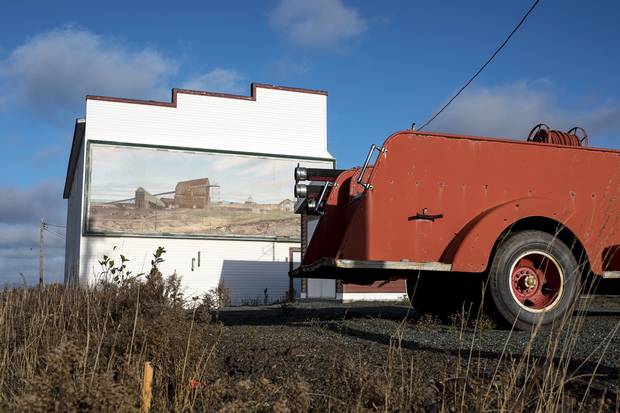
A mural depicts the town of Wabana’s mining history. The island had as many as 13,000 residents at the peak of the iron-ore boom, but when the mines closed in the 1960s, the population plummeted.
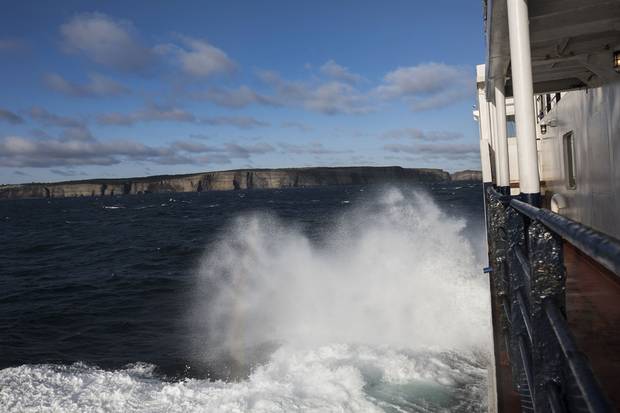
Bell Island is visible in the distance as the MV Flanders ferry crosses over from Portugal Cove. Now with some 2,500 residents, the island has no real industry left other than tourism.
The ferry ride across the tickle from Portugal Cove to Bell Island is full of visual drama. Bell Island, which is in Conception Bay, is a gorgeous slab of sandstone and shale and soaring, take-your-breath-away cliffs.
When Joe Donkers first set eyes on it, he knew Bell Island was home. "The place is magic. It was totally captivating," the Ontario transplant said. Although his passion is community development, Mr. Donkers took a job as the tax collector for the Town of Wabana, the largest of three communities on the island. It gave him a direct window into the economic and social struggles hobbling his new community.
Statistics confirmed what Mr. Donkers saw: A huge number of people were reliant on social assistance, and the lack of jobs on the island meant people were often forced to choose between unemployment or leaving home. A wellness report commissioned by the town in 2006 put the proportion at 44 per cent of island residents. It also highlighted an islandwide gambling problem, crumbling infrastructure, chronic boil-water advisories and a population at risk.
To locals, the report was just another black mark on their town. The darkest, of course, was the shutdown of the iron ore mines in 1966. That industry had transformed the island into a boom town with more than 13,000 residents at its peak. It also made the community unique – it is rare in Newfoundland for an outport town not to rely on fishing. When the mines closed, the population hollowed out as people left in search of jobs. More than half a century later, there is still no real industry on Bell Island, population 2,500, aside from tourism. Most jobs in tourism are fuelled by government grants.
Years ago, it fell to Mr. Donkers to build a sustainability plan for the town. He helped launch Tourism Bell Island, which was assumed by a local man passionate about the community's future. His name was Henry Crane.
Mr. Donkers also saw the need for more community dialogue. The idea of a community radio station was floated. It took off. The original group of volunteers included Mr. Crane, Ms. Kearley and her husband, renowned fiddler and Order of Canada recipient Kelly Russell. Students, too, were eager to help.
Radio Bell Island went live in January, 2013. It was an immediate hit. "It was beyond our wildest expectations. There was a real polish to it," Mr. Donkers recalled. "For a period there, the community saw something new in itself." Mr. Crane remembers the time as electric. "We had people in high school all the way up to our most senior citizens," he said. "It was so exciting."
Donovan Taplin, a former student at St. Michael's who is now a Master's candidate at Ryerson University, was the first voice on air. He would go on to land a number of high-profile interviews, including one memorable spot with retired CBC broadcaster Peter Mansbridge.
"We transformed a school cafeteria into a place where intergenerational dialogue could happen. It filled a gap in the community," he said. "That had not existed before."
Mr. Taplin is now a member of the Prime Minister's Youth Council and a candidate for a Rhodes Scholarship. Having access to Radio Bell Island, he said, changed the course of his life.
"There's a saying that you can't be what you can't see. And on Bell Island, you can't see beyond the cliffs sometimes," he said. "Radio Bell Island gave young people from a small town in rural Newfoundland the opportunity to get on the air and play an instrument and have someone across the country hear it.
"That was transformative."

St. Michael’s Regional High School was built in Bell Island’s economic heyday. In 2013, it became the home of Radio Bell Island.
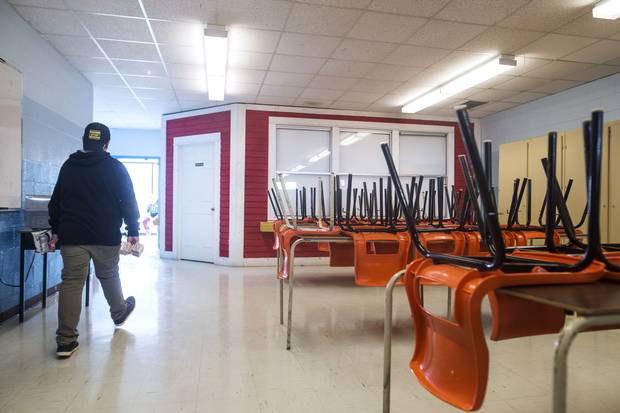
The radio station has a tiny studio in a walled-off part of the school’s cafeteria, broadcasting from an antenna on the roof.
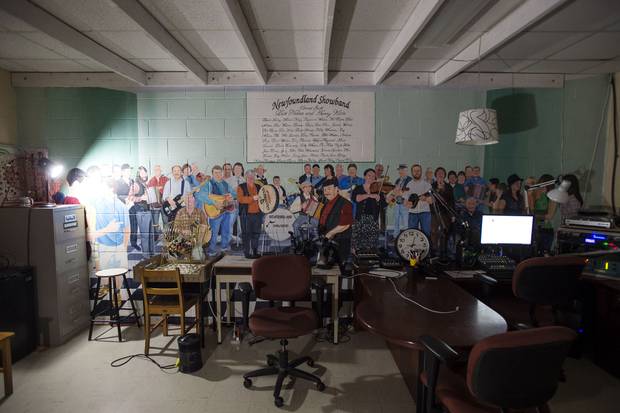
The station continues to operate from the high school, but it is now shuttered to students and the school no longer gets a cut of bingo proceeds.
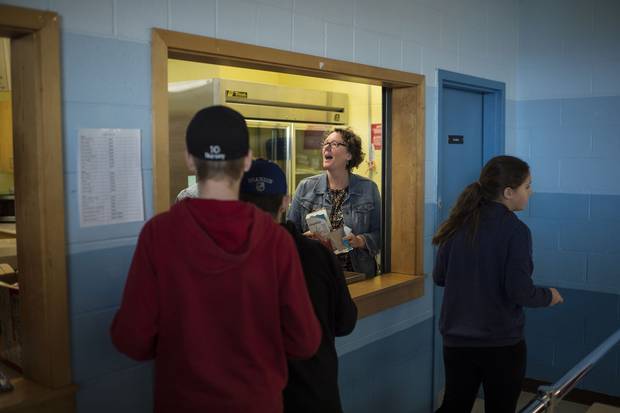
Principal Tonya Kearley saw students’ grades and attendance rise as they got involved in the radio station, writing music, reading news and learning about broadcasting technology.
Inside the school, Ms. Kearley, the principal, could just about measure how much.
Attendance, marks and graduation rates were starting to climb along with spirits inside of the school, which has less than 150 students, many of whom come from proud but disadvantaged homes. Finding extra money for field trips off the island – to the university in St. John's, for example – was often out of the question. The same went for new prom dresses, internet access, computers at home and sometimes even food.
"It's not a ghetto, not geographically. But it's socioeconomically inner-city," Ms. Kearley said. "Lots of children here have plenty in their lives. But they don't have the means that would allow them to participate fully," she said, adding: "Education should not cost a cent."
Once Radio Bell bingo took off, it didn't. Launched to raise money for the station, the weekly games were held on Sunday evenings and run, at first, by Mr. Russell, the station manager, and Ms. Kearley. The work of getting bingo cards printed and distributed for sale was shared by Mr. Crane and his team of volunteers at Tourism Bell Island.
An agreement was struck that proceeds from the games would be split three ways, between Radio Bell Island, Tourism Bell Island and the high school, reflecting the causes closest to the stakeholders on the board.
The spoils quickly began to add up. Over one 22-month period, St. Michael's found itself with $122,000 in bingo money. It was as if the school had won the lottery.
The cash enabled Ms. Kearley to narrow gaps that neither the school board nor parents had the ability to. She improved students' access to technology by buying iPads and Smart Boards for the school. There were new uniforms for sports and the cheer squad, which had been using the same gear since the 1980s. She added band equipment, a motorized screen in the gym and built up a stock of personal items she knew many students were grateful for. Drawers in the school office were filled with deodorant, new clothing and even feminine products for female students, which they were free to take home.
The school was literally brightened, repainted in bright shades of blue that students chose. Second-hand couches were purchased to give students comfortable lounging space in the library. Field trips to the university or the theatre were finally free for any student who wanted to go.
Ms. Kearley said she saw herself as "filling the school up with stuff students didn't have in their lives. We made it a place they need to come to."
Before long, though, a bizarre battle for control of the radio station would jeopardize students' access to their most prized asset.

Bell Island city councillor Henry Crane wants to have a hand in shaping the community’s future, but his methods have sometimes proven controversial. ‘I’ve been called a Nazi, a socialist, a sexist, you name it,’ he says. ‘Well, yeah, yeah, yeah, sticks and stones.’
Despite the community's support of Radio Bell Island, only a small group of people volunteered their time to run it. Some years, the radio board, including Ms. Kearley and Mr. Crane, had its membership acclaimed because of the lack of community interest in holding the positions.
It was a surprise to many, then, when several hundred townspeople packed the radio board meeting in September of 2016. Ms. Kearley, who was serving a two-year term, watched in amazement as a slate of new members was elected. Mr. Crane knew all of them. Many already sat on or volunteered with his tourism board. Mr. Russell, the station manager, said it felt like "a coup." Mr. Crane denies that he attempted to stack the radio board with allies. But there is no dispute over the fact that in the lead-up to the meeting, he had spent months locking horns with Ms. Kearley and Mr. Russell behind closed doors.
Mr. Crane, who has made clear his intention to have a hand in shaping Bell Island's future, likes to repeat a saying inspired by the Second World War general George S. Patton: "Lead, follow, or get out of the way." At Tourism Bell Island, that approach often inspired people. On the radio board, it only led to acrimony.
Disagreements amongst the strong personalities often spilled onto social-media feeds, spreading a sourness throughout the town. Relations deteriorated to the point that the board was unable to reach consensus on any decision, big or small. Tension mounted between Ms. Kearley and Mr. Crane, who wanted move the radio station out of the school. His reasons include easier access for community members.
After the new radio board was elected, Mr. Russell, the station manager, resigned.
"I knew what was happening," he said in a recent interview. "I would have been told what to do, to be compliant as they decided to cut out the school. It was going against all I had worked towards, which was building an asset for the school and the community."
One month into their term, the new board members held a meeting that Ms. Kearley was not invited to. She was accused of disrespecting other members and a vote to suspend her from the board "for conduct unbecoming of a board member" was carried even though the radio's constitution does not appear to contain mechanism to allow it.
Around the same time, the school stopped receiving its share of radio bingo proceeds. There was no written notice. Payments to the school simply halted. The school eventually received a letter from the radio board saying its status had dropped from that of a stakeholder: If the school wanted any more bingo money it could send a letter of application for the board for consideration.
Meanwhile, at the school district offices, a flood of complaints against Ms. Kearley, including allegations that she was unfit to continue serving as principal, had begun.
Mr. Crane, a retired parole officer and former college instructor, said he did not organize the flood of complaints. He did admit to making one against Ms. Kearley to the provincial Department of Education, though. It was related to a Facebook picture that shows the principal sticking her tongue out while laughing with three friends on an evening out. Mr. Crane said he found the picture "appalling."
Ms. Kearley's school district decided her conduct was just fine. An investigation into all of the complaints cleared her name. It also flagged the concern that she was being harassed via "an organized attack on [her] professional reputation," wrote Andrew Hickey, a senior education officer with the Newfoundland and Labrador English School District.
Ms. Kearley took her concerns to the local RCMP detachment but says she was brushed off. At least two more women on Bell Island have said they spoke to RCMP about harassment concerns related to radio board members' conduct to no avail. The RCMP did not respond to The Globe and Mail's request for comment.
Mr. Crane scoffs at the allegations. "I've been called a Nazi, a socialist, a sexist, you name it. Well, yeah, yeah, yeah, sticks and stones," he said in an interview.
In February, the provincial department responsible for lottery licences audited the radio bingo payouts. It told the board to pay the school, which was listed as a fundraising recipient on the bingo licence, the money that had been withheld.
The board paid up and then found a way to deke around having to pay more. When the radio's bingo licence came up for renewal in May, St. Michael's was not named as an intended recipient of bingo proceeds. The board could decide where the money went in the community and was no longer compelled to pay anything to the school.
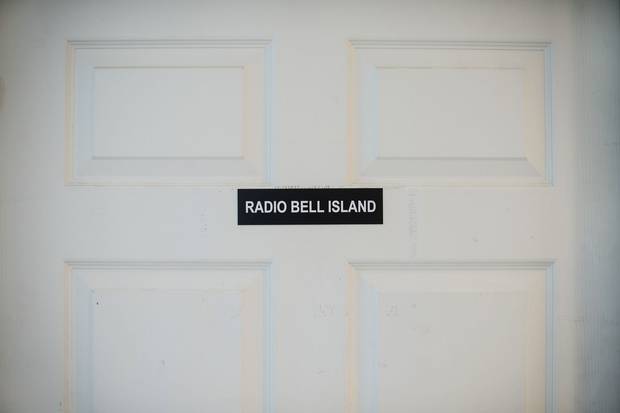
A retired provincial court judge weighed in on the drama at Radio Bell Island when the town of Wabana hired him as a mediator.
Desperate for a solution that might pull the community out of turmoil, the Town of Wabana hired a mediator. His decision would have no binding authority on the radio board, but the hope was that the move would inspire compromise.
It did not work. The mediator, retired provincial court Justice Robert Smith, titled his report Another Failed Mediation.
"I wouldn't have taken it on if I had known what it was going to turn into," Mr. Smith said in an interview last week. "I've never seen anything like this. It left me with a horrendous number of concerns," he said.
Mr. Smith is so troubled that he has taken the unusual step of contacting the RCMP himself, in both Newfoundland and Ottawa, hoping to jump-start an investigation. His complaints pertain to things outside the scope of the disagreement that required mediation, but that he discovered accidentally, he says, over the course of his work. They include allegations of improper spending of taxpayer dollars by the tourism board, led by Mr. Crane.
"As I understand it, there is no independent audit looking for possible fraud," Mr. Smith wrote in his report obtained by The Globe, adding: "There should be!"
He goes on to level more troubling allegations against Mr. Crane, including alleging he is the architect of the campaign to discredit Ms. Kearley. "It is disgraceful and shows a level of unethical behaviour that should not be tolerated by the Town of Wabana."
The mayor, Gary Gosine, does not disagree. But since September, his council has included Mr. Crane and another member of Radio Bell Island's board who do not perceive themselves to have a conflict of interest in being involved with radio, council and the tourism board. Mr. Gosine said he has no idea what can be done and the stress is affecting his health.
"I think it's going to get worse before anything gets better," he said.
Among residents, there is widespread concern over the amount of influence a small group has come to wield in their town. There is no doubt that Mr. Crane has a clear vision of the way forward – remember: "Lead, follow, get out of the way" – but his approach has been inconsistent with building consensus and inclusion.
Instead, it has driven people away. Ms. Kearley and Mr. Russell moved their family off the island in October; Ms. Kearley commutes back from St. John's each day. Mr. Smith called the development tragic. "They have so much to offer the island. To drive them away? It's astonishing," he said. "How you can get manipulated out of your share and have the radio station taken over by an outside group …" he said, trailing off. "It's mind-boggling."
Asked in an interview whether he is motivated by power, Mr. Crane laughed. "I don't want to be king of the volunteers," he said. "I believe this island is a gold mine. It's a gem. When I got involved, I got involved for one reason: to make it better for everybody else. That's the reason I do it," he said. "That's the only reason I do it."
Still, he appears determined to leverage his new council seat to move the radio station into the town hall. The radio's founders are left shaking their heads.
"Taking it to the town hall strips the radio station of its capacity to be a tool for social change. It will be to the detriment of the community and the community's young people," former student Mr. Taplin said. "Young people on Bell Island already have a hard shake at things. This radio station was something that was finally changing that."
THE GLOBE IN ATLANTIC CANADA: MORE READING




